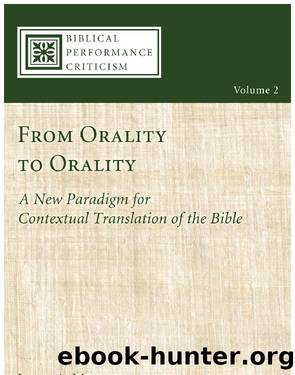From Orality to Orality by From Orality to Orality. A New Paradigm for Contextual Translation of the Bible (2009)

Author:From Orality to Orality. A New Paradigm for Contextual Translation of the Bible (2009)
Language: eng
Format: epub
Published: 2022-02-15T00:00:00+00:00
* Vernon K. Robbins suggests a continuum within a rhetorical culture in terms of intertextuality: reference, recitation, recontextualization, reconfiguration, and echo (âOral, Rhetorical, and Literary Cultures,â 82â88).
An early influential biblical scholar in relation to issues of orality is Pieter J. J. Botha. Botha has done a great service by condensing Harrisâ general study of ancient literacy as well as contributing his own insights in his approach to New Testament studies.34 An important assertion by Botha is that the mediaâorality and literacyâare not neutral. The media shape the message. âCommunication media not only reflect culture but also influence it fundamentally.â35 Botha confronts recent biblical studies and accuses scholars of assuming a print bias in their research. âThe thesis of this paper is that an unrecognized assumption underlies most exegetical activities, namely that writing implies a constant role and/or function in communication.â36 While admitting that every society uses oral strategies in communication, Botha pushes to recognize a distinction in societies where oral communication is highly valued. âOrality refers to the experience of words (and speech) in the habitat of sound.â37 Botha is not seeking to establish a great-divide theory, but recognizes that communication media are culture specific. For the first-century setting, a fusion of written and oral was used, a fusion that made use of the oral bias of the society. âParticularly, it is the insight that writing and speech are culturally embedded phenomena, similar to other social conventions, that we need to facilitate in a comprehensive approach to our texts.â38 Noting the predominance of orality, yet appreciating the gradation of literacy in antiquity, Botha understands literacyâs role in the service of orality. However, Botha notes an important point that will be discussed in greater detail below: the relationship of bureaucratic power with literacy. This aspect of power is linked to religion: âBut more significantly, the written word itself exercised religious power . . . But the use of the written word to convey religious messages remained connected to the oral (this is so even for Paul).â39
Besides the link of political and religious authority to literacy, Botha pursues the function of literacy in letter writing. This is especially helpful in order to imagine the use of literacy in the New Testament epistlesâespecially Paul.40 Beginning more broadly, Botha corrects some potential anachronistic assumptions about first-century literacy. Education does not equal literacy: âIn Greco-Roman societies one could be educated without having the ability to read and write.â41 âTo describe the Hellenistic age as an oral world does not mean that the people were not familiar with writing and did not employ writing during their lives . . . Writing was a product and a commodity to be sold, not an intellectual process . . . Whatever we make of ancient letters, orality was part and parcel of the whole process . . . The point to see is that they are texts that originated as and were designed for oral presentations.â42 The critical point about letter writing in an oral settingâspecifically of the first centuryâis the communal and auditory components.
Download
This site does not store any files on its server. We only index and link to content provided by other sites. Please contact the content providers to delete copyright contents if any and email us, we'll remove relevant links or contents immediately.
Machine Learning at Scale with H2O by Gregory Keys | David Whiting(4296)
Never by Ken Follett(3937)
Fairy Tale by Stephen King(3370)
Reminders of Him: A Novel by Colleen Hoover(3096)
The Man Who Died Twice by Richard Osman(3073)
Will by Will Smith(2911)
Rationality by Steven Pinker(2352)
It Starts With Us (It Ends with Us #2) by Colleen Hoover(2345)
Can't Hurt Me: Master Your Mind and Defy the Odds - Clean Edition by David Goggins(2324)
Friends, Lovers, and the Big Terrible Thing by Matthew Perry(2219)
The Becoming by Nora Roberts(2189)
The Stranger in the Lifeboat by Mitch Albom(2113)
Love on the Brain by Ali Hazelwood(2062)
New Morning Mercies: A Daily Gospel Devotional by Paul David Tripp(1917)
A Short History of War by Jeremy Black(1843)
The Strength In Our Scars by Bianca Sparacino(1841)
HBR's 10 Must Reads 2022 by Harvard Business Review(1840)
A Game of Thrones (The Illustrated Edition) by George R. R. Martin(1726)
Never Finished: Unshackle Your Mind and Win the War Within by David Goggins(1705)
